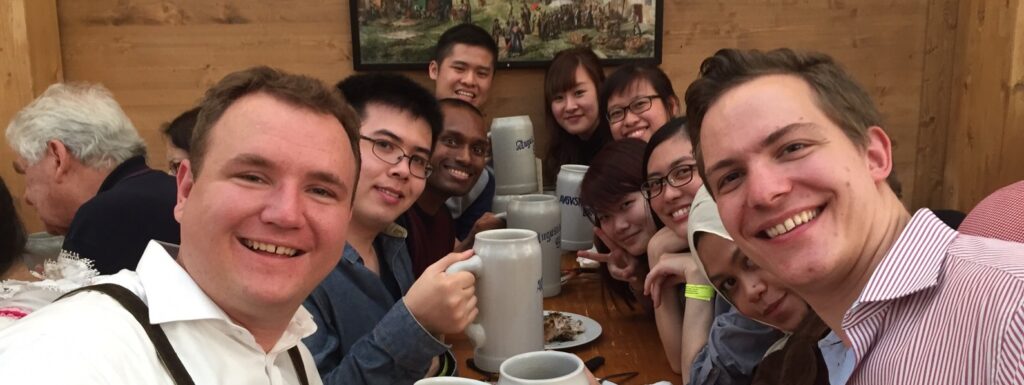
Gaja has been acquainted with the field of chemical engineering since his polytechnic days. After graduating from the Bachelor of Science in Chemical Engineering in 2016, he delved right into the field from process engineering to operations engineering, acquiring skills in plant operations, process design, data analysis and root cause assessment. The DIGEST team speaks with him to find out some of the experiences he had as an engineer.
Hi Gaja, can you give us a short introduction about yourself?
Hi! I’m Gaja and I graduated from the Bachelor of Science in Chemical Engineering programme in 2016. Since then, I have been involved in the field of chemical engineering – first as a process engineer, and now currently as an operations engineer at The Linde Group. Chemical engineering has been a part of my education since my polytechnic days and so you can say I’m a fan of the field.
What is one thing you particularly enjoyed during your university life?
Personally, I enjoyed bonding with my classmates especially during our time spent in Munich for the Overseas Immersion Programme. It kept us close and till today, we still meet up with one another for special occasions. Academics wise, I enjoyed learning about the intricacies of Physics, Chemistry and Mathematics. The course provided by TUM was not just limited to the engineering concepts, but it gave us insights into the rationale behind the theories we learn and the equations we utilize.
Was there an Aha!-experience in your university time? What is it?
The loudest ‘Aha!’s tend to come during the lectures and tutorials when we finally understood what the professor has been talking about for the past four hours.
“In theory, everything can be assumed to be ideal or with a bit of variation. In real-life scenarios, engineers are required to apply critical thinking especially when the unexpected comes into play. “
From a process engineer to an operations engineer, how has your career experiences contributed to your growth as an engineer?
Engineering is an ever-learning field. In theory, everything can be assumed to be ideal or with a bit of variation. In real-life scenarios, engineers are required to apply critical thinking especially when the unexpected comes into play.
As an engineer for two and a half years, I encountered countless onsite challenges such as issues with the purity of a product at parts per billion (PPB) levels, surging compressors for no obvious reasons, locating a faulty transmitter out of hundreds before the plant trips and even carbon monoxide leaks.
Encountering and dealing new challenges along the way has helped me grow as an engineer, as they helped me develop better critical thinking and problem-solving skills.

Share with us an interesting encounter you had at your current company.
The plant that I am working in consists of a liquid argon purification system connected to the cryogenic distillation column, which we use to purify argon. We were notified that the storage tank was venting excessively due to pressure build up, which happens when the liquid turns into gas in the tank. We had a re-condenser system to prevent this problem from happening.
I was tasked to find out the cause of the excessive venting and resolve the issue. Together with my colleague, I discovered that there was a faulty control valve to the re-condenser system which prevented the gaseous argon from condensing back to a liquid state. It was not commercially viable to shut down the entire plant to repair one system, thus I worked with an expert to come up with another solution. We changed the piping which allowed better heat transfer and increased the efficiency of our purification system.
And it worked!
Was there an experience or encounter in TUM Asia that has helped to shape your life? What is it?
It would be the life lessons that were learned along the way. While being a student was fun, I learnt to take responsibility for my own decisions especially in my studies. Transiting to university life right after army was overwhelming at first, because I had lost touch with Mathematics. The topics we studied were challenging and I had to constantly keep up with the pace of the curriculum.
But at one point, I told myself that choosing to study this course was my own decision, and I should be responsible of my own decision. With this mindset and the constant support of my classmates, I made it to graduation and the completion of my degree course.
What is your advice for the younger generation of students in TUM Asia?
Study hard and have fun at the same time! Let your memories of university life be more than just lectures, tutorials and notes. Keep your hobbies, play your games and engage your social circle. While the curriculum may not be easy, remember that you are part of a program will give you an edge over the others with the knowledge and skills that you will gain.
Gaja studied in the Bachelor of Science degree in Chemical Engineering with the Technical University of Munich. He studied in the Singapore branch campus (TUM Asia) and spent five months in Munich, Germany to complete his lab courses and thesis at the home campus of the university.
